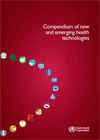
The compendium 2011 is a first snapshot of several health technologies which might have the potential to improve health outcomes or to offer a solution to an unmet medical need in low-resource settings. The compendium specifically focuses on innovative technologies that are not yet widely available in developing countries, and product concepts under way.
Technologies in the compendium are presented in one page summarizing the health problem addressed, the proposed solution and product specifications, based on data and information provided by the developers of the technologies concerned.
Download WHO Compendium 2011 of New and Emerging Health Technologies (.pdf, 3.263 KB).
Download from eHealthNews.eu Portal's mirror: WHO Compendium 2011 of New and Emerging Health Technologies (.pdf, 3.263 KB).